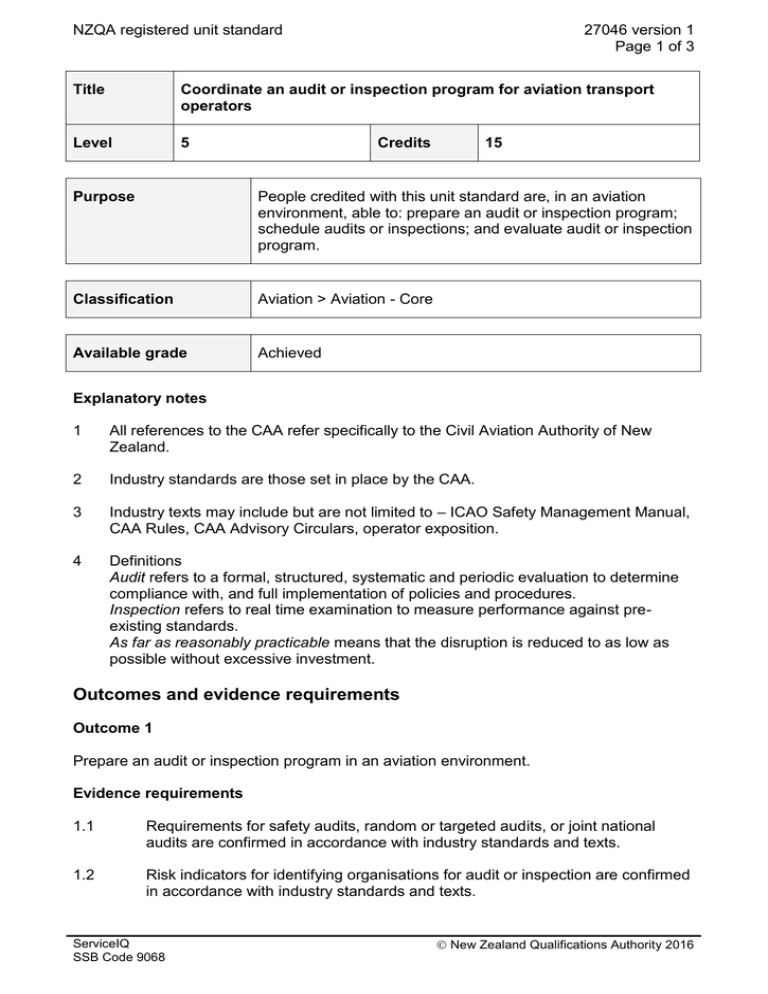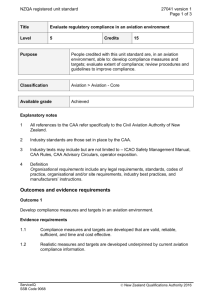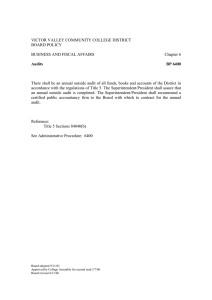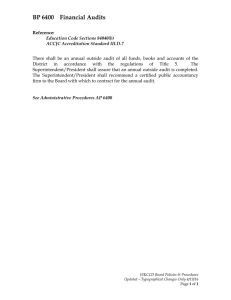NZQA registered unit standard 27046 version 1 Page 1 of 3
advertisement

NZQA registered unit standard 27046 version 1 Page 1 of 3 Title Coordinate an audit or inspection program for aviation transport operators Level 5 Credits 15 Purpose People credited with this unit standard are, in an aviation environment, able to: prepare an audit or inspection program; schedule audits or inspections; and evaluate audit or inspection program. Classification Aviation > Aviation - Core Available grade Achieved Explanatory notes 1 All references to the CAA refer specifically to the Civil Aviation Authority of New Zealand. 2 Industry standards are those set in place by the CAA. 3 Industry texts may include but are not limited to – ICAO Safety Management Manual, CAA Rules, CAA Advisory Circulars, operator exposition. 4 Definitions Audit refers to a formal, structured, systematic and periodic evaluation to determine compliance with, and full implementation of policies and procedures. Inspection refers to real time examination to measure performance against preexisting standards. As far as reasonably practicable means that the disruption is reduced to as low as possible without excessive investment. Outcomes and evidence requirements Outcome 1 Prepare an audit or inspection program in an aviation environment. Evidence requirements 1.1 Requirements for safety audits, random or targeted audits, or joint national audits are confirmed in accordance with industry standards and texts. 1.2 Risk indicators for identifying organisations for audit or inspection are confirmed in accordance with industry standards and texts. ServiceIQ SSB Code 9068 New Zealand Qualifications Authority 2016 NZQA registered unit standard 27046 version 1 Page 2 of 3 1.3 Information on the current performance of organisations and their operating environment is gathered and analysed in accordance with industry standards and texts. 1.4 Intelligence and occurrence information are analysed against risk indicators and risk ratings are determined in accordance with risk management principles and legislative requirements. 1.5 Data to be used for risk analysis is checked to ensure it is valid, sufficient, current, and verifiable. Outcome 2 Schedule audits or inspections in an aviation environment. Evidence requirements 2.1 Type, scope, and frequency of audits or inspections are determined in accordance with risk management principles and legislative requirements. 2.2 All elements of the system are audited or inspected over a prescribed period, with priority assigned to those matters representing greatest risk and those that need to be audited or inspected in that period. 2.3 Audit or inspection schedule is prepared, including assigning responsibility for conducting audit or inspection, in accordance with industry standards and texts. 2.4 Audit or inspection schedule is structured to minimise the impact on the business operations of the aviation organisation, as far as is reasonably practicable. 2.5 Audit or inspection schedule is scheduled taking into account the scheduling of national audits, and human and other resource requirements. Outcome 3 Evaluate audit or inspection program in an aviation environment. Evidence requirements 3.1 Quality of conducted audits or inspections is evaluated against industry standards and texts. Any anomalies and inconsistencies are identified. 3.2 Moderation processes are used in accordance with industry standards and texts to ensure a consistent approach to audit or inspection. 3.3 Improvements in audit or inspection practices and processes are identified and implemented in accordance with industry standards and texts. 3.4 Audit or inspection data is analysed to identify risk issues and trends for the aviation industry or for particular types of aviation organisations. ServiceIQ SSB Code 9068 New Zealand Qualifications Authority 2016 NZQA registered unit standard 27046 version 1 Page 3 of 3 3.5 Strategic information on issues and trends is documented so it may be provided to management and other stakeholders in accordance with industry standards and texts. 3.6 Audit or inspection program is reviewed and re-prioritised on a regular basis in accordance with industry standards and texts. Planned review date 31 December 2016 Status information and last date for assessment for superseded versions Process Version Date Last Date for Assessment Registration 1 15 April 2011 N/A Consent and Moderation Requirements (CMR) reference 0170 This CMR can be accessed at http://www.nzqa.govt.nz/framework/search/index.do. Please note Providers must be granted consent to assess against standards (accredited) by NZQA, before they can report credits from assessment against unit standards or deliver courses of study leading to that assessment. Industry Training Organisations must be granted consent to assess against standards by NZQA before they can register credits from assessment against unit standards. Providers and Industry Training Organisations, which have been granted consent and which are assessing against unit standards must engage with the moderation system that applies to those standards. Requirements for consent to assess and an outline of the moderation system that applies to this standard are outlined in the Consent and Moderation Requirements (CMRs). The CMR also includes useful information about special requirements for organisations wishing to develop education and training programmes, such as minimum qualifications for tutors and assessors, and special resource requirements. Comments on this unit standard Please contact the ServiceIQ qualifications@serviceiq.org.nz if you wish to suggest changes to the content of this unit standard. ServiceIQ SSB Code 9068 New Zealand Qualifications Authority 2016


